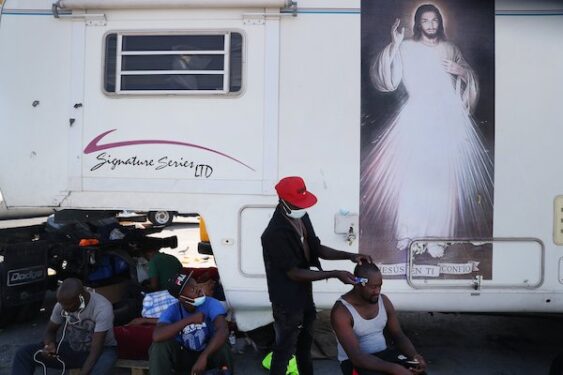By David Agren
MEXICO CITY (CNS) –The Mexican bishops’ migrant ministry has called on the federal government to return to a policy of “open arms” as the country experiences heavy waves of migration — most visibly with Haitians, who recently traveled the length of Mexico to the U.S. border in large numbers.

“As a church, we exhort the Mexican government to abandon the militarized migratory policy and recover our tradition of a country with open arms, welcoming, protecting, promoting and integrating migrants,” the ministry said in a letter marking World Day of Migrants and Refugees Sept. 26.
The letter, signed by Bishop José Guadalupe Torres Campos of Ciudad Juárez, ministry director, continued: “We call on the Mexican church, in communion with the Holy Father, to open our hearts and tear down the walls of discrimination, prejudice and the rejections of those who suffer most.
We extend a hand to those walking and transiting our streets, parishes and dioceses, to the migrants fleeing repression and pain, who are in search of love and freedom that they cannot find in their countries of origin.”
The church’s call for Mexico to revisit its migration policies followed the arrival of some 14,500 Haitians in Del Rio, Texas, where they camped under a bridge as they waited to be processed by U.S. border officials. Many of the migrants were returned to Mexico, some families were admitted into the United States with citations to appear at immigration offices, while planeloads of Haitians were returned to Haiti — where many had not lived for years. Many of the Haitians traveling toward the United States left after the 2010 earthquake on the island and had been working in Brazil and Chile until encountering difficulties in those countries.
Wilner Meletus, an advocate for Haitians in Mexico, said an estimated 30,000 Haitians have been stranded in the city of Tapachula near the Guatemala border, waiting for travel documents or asylum hearings. He was uncertain how the migrants arrived at the U.S. border; Mexican immigration officials had been arresting “anyone” leaving Tapachula, he said. More Haitians are heading north through South and Central America, he said, with “hundreds” entering Mexico every week.
Such is the crush of Haitians that the diocesan migrant shelter in Tapachula, near the border with Guatemala, said it was running out of food, according to local media.
In Guatemala, the bishops’ migrant ministry said: “The commitment to our brother and sister migrants and asylum-seekers calls us and challenges us to go against the current, to contrast with the general tendency toward cultural, social and political polarization. … This challenge is based on the free and conscious decision to recognize all other people as brothers and sisters, as an integral and important part of our lives and, therefore, a single inclusive us.”
